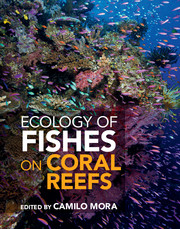Book contents
- Frontmatter
- Contents
- Preface
- Foreword
- List of contributors
- PART I BASIC ECOLOGY
- PART II PATTERNS AND PROCESSES
- PART III HUMAN FINGERPRINTS
- PART IV CONSERVATION
- PART V DEBATES AND PARADIGM SHIFTS
- 23 Is dispersal of larval reef fishes passive?
- 24 Density dependence and independence and the population dynamics of coral reef fishes
- 25 Equilibrial versus non-equilibrial dynamics in coral reef fishes
- 26 Cryptic density dependence: integrating supply-side ecology with population regulation
- 27 Priority effects
- 28 Inverted trophic pyramids
- 29 Shifting baselines in coral reef fishes
- 30 Pluralism explains diversity in the Coral Triangle
- 31 Reef fish biogeographical regions
- 32 Size and sex change
- 33 Quantifying reef fishes: bias in observational approaches
- 34 Seascape ecology of fishes on coral reefs
- 35 The future for coral reef fishes
- 36 Perpetual struggle for conservation in a crowded world and the needed paradigm shift for easing ultimate burdens
- References
- Index
29 - Shifting baselines in coral reef fishes
from PART V - DEBATES AND PARADIGM SHIFTS
Published online by Cambridge University Press: 05 May 2015
- Frontmatter
- Contents
- Preface
- Foreword
- List of contributors
- PART I BASIC ECOLOGY
- PART II PATTERNS AND PROCESSES
- PART III HUMAN FINGERPRINTS
- PART IV CONSERVATION
- PART V DEBATES AND PARADIGM SHIFTS
- 23 Is dispersal of larval reef fishes passive?
- 24 Density dependence and independence and the population dynamics of coral reef fishes
- 25 Equilibrial versus non-equilibrial dynamics in coral reef fishes
- 26 Cryptic density dependence: integrating supply-side ecology with population regulation
- 27 Priority effects
- 28 Inverted trophic pyramids
- 29 Shifting baselines in coral reef fishes
- 30 Pluralism explains diversity in the Coral Triangle
- 31 Reef fish biogeographical regions
- 32 Size and sex change
- 33 Quantifying reef fishes: bias in observational approaches
- 34 Seascape ecology of fishes on coral reefs
- 35 The future for coral reef fishes
- 36 Perpetual struggle for conservation in a crowded world and the needed paradigm shift for easing ultimate burdens
- References
- Index
Summary
Coral reefs have been degraded by human activities over time, beginning historically with overfishing, and more recently followed by pollution, habitat destruction, and climate change. Because of these combined impacts, coral reef fishes have declined in abundance, size, and biomass over time, and reef fish food webs have become shorter and less resilient. This global degradation started under the impacts of fishing long before we started studying coral reef fishes in a systematic way. Because of that, our perception of what was natural – our baseline – is biased, and is shifting over time as new generations develop their own baselines based on their own personal experience. Most of our understanding of coral reefs came from reefs that were somehow degraded, where large predators were just a memory and fish populations were dominated by small species from lower trophic levels. But in the last 20 years, the birth of the field of marine historical ecology, the study of previously unexplored remote coral reefs, and the recovery of fishes in effective no-take marine reserves have provided a proxy for what reef fish assemblages used to look like prior to human exploitation. Resetting the ecological baseline is crucial for understanding the true magnitude of human impacts on coral reefs, for properly evaluating the efficacy of our management actions, and as a benchmark for coral reef conservation.
THE SHIFTING BASELINE SYNDROME
In 1995, fisheries biologist Daniel Pauly published a seminal paper describing what he called the “shifting baseline syndrome” in fisheries [1937]. According to Pauly, fisheries scientists accepted as a baseline the stock size that occurred when they started their careers. Since the stocks tend to decline over time because of overexploitation, the next generation will adopt a diminished baseline. Everything that baseline is used for – such as determining the total allowable catch for a species – will be biased because the baseline has shifted relative to former baselines [1226,1528,1963]; a process also termed “environmental generational amnesia” in other fields [1712].
- Type
- Chapter
- Information
- Ecology of Fishes on Coral Reefs , pp. 252 - 257Publisher: Cambridge University PressPrint publication year: 2015
- 3
- Cited by



